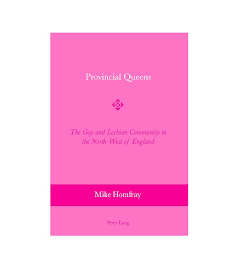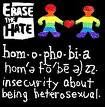Friday, February 15, 2008
Doublethink
First, those who actually agree with the ABC in wanting religious space, but wishing that to be 1) either universally imposed on everyone irrespective of their personal beliefs, or 2) selectively applied meaning that only their religions count. This is the conservative Christians position, and also that espoused by conservative commentators like Mad Mel Phillips. So, we ignore laws we don;t like (such as gay equality) and fulminate against it because it offends our religious sensibilities, but Islam is a wicked and evil religion and so should not be given space within the law, unlike us, because we are nice and British and they are evil and foreign and all terrorists wanting to turn this country into Londonistan writ large.....you know the rest....
Its an utterly illogical argument. It relies on a view that we first accept the essential goodness of conservative religiosity for some religions and not others - even though their social views are all much the same!
The other doublethink is the way that conservative Christians use the 'Christendom' view when it suits them but rejects it when it doesn't.
So, if they wish to convert others to their religion, the vast majority of us are evil sinners outside God's grace, heading to hell in a hand basket. But when they want to argue for theior views to hold sway in civil society, then we are a Christian country and 72% of us said so in the last census, don't cha know....
So, which is it to be - because the two positions are incompatible. Recent research has shown very clearly that very few of that 72% believe much more than Christianity is about being nice to people and synonymous with being English. So, why shopukd they expect their view to dominate in the making of civil law?
Sunday, February 10, 2008
More fall out from RW
The positive outcome of all this is that Williams' aim of trying to advocate different laws for the religious has fallen flat on its face. people clearly feel there should be one law for all and that law should not be overly influenced by religion.
We are effectively a secular country. For most people religion means little more than a vague belief in 'something more' and somewhere to get married or buried, though less and less so all the time.
We don't like extreme religion and think it should stay in the private sphere for those who wish to believe it.
And RW has ensured no more religionist opt-outs and the slow death of those that remain - for that we should thank him.
Conservative religionists are livid because it has displayed how very far they are from achieving their Christian conservative theocracy.
But it has also showed how little people and particularly the Press bother to read what people actually say unless it is in simple soundbites.
Friday, February 08, 2008
Sharia Law?
What I think he seems to be saying is far less radical then the headlines will no doubt say (though this is RW so he might be saying something quite different)
I think he is starting from the position that he wants to preserve some space for religious thinking alongside the secular law, which means that there may be areas where religious attitudes or regulations can run alongside the secular law. The exemptions from the SOR's given to the church would be an example of that.
I think RW is suggesting that there may be areas where Sharia law can be respected and seen as acceptable alongside secular law - for example, with regard to some areas of family law within Muslim communities, perhaps on the lines of the acceptability of the Beth Din which has control of some aspects of family law within the orthodox Jewish community ( and is respected by the state)
I think, though, that his agenda is to try and preserve a religious space given the logic of a multi-faith society is increasing secularism as no religion is given preference. i think he is worried that unless this space is given for sharia, then Christians' privileges may be lost.
My own view is that the civil law should be secular, and that means no exemptions for anyone, but I think it likely that churches and mosques alike are likely to practice that which they believe in within their own walls, which is what freedom of religion means. But if some Christians wish to see Christianity receive a privileged place, then there will also be Muslims asking for the same and in a pluralist society there is no logic in refusing. So - one law for all, no exemptions for religion. And no superior place for a church which the vast majority of citizens have no interest in attending.
Tuesday, February 05, 2008
Busy, busy....but some passing thoughts on Bishop James Jones
But, a couple of thoughts. Bishop James Jones of Liverpool has published an essay in which he offers apology to Jeffrey John for the way in which he opposed his being chosen as Bishop of reading. The essay also looks more widely at the issues surrounding biblical notions of same-sex friendship and the attitude of the Anglican church.
I wasn't surprised to read the article (its at http://www.liverpool.anglican.org/people/bishops/jamesspeeches/0712_Lambeth_essay.htm if you want to read it for yourself).
I think that there has been some hyperbole from both sides of the argument. Conservatives appear to be either keen to portray Bishop James as having abandoned their position, or wish to minimise the step he has taken in revising his perceived position. Liberals and the report in the Guardian are over-egging the pudding in the other direction.
I think that the situation and the views of JJ are more nuanced. I haven't met him for a while since I ceased active involvement with Changing Attitude, and then the Church, but I have met him on a number of occasions, and it is no secret that I served on the Theology of Friendship Group which he refers to in the article. I think the following observations are fair.
First, that his position has certainly softened in terms of what he thought and said when I first had contact with him
Second, that I think he is carefully saying what he can find in the Biblical account without necessarily imputing that which cannot be fairly imputed, given the reality of social construction. David and Jonathan loved one another and they may have had sexual contact - but that doesn't make them 'gay' in a Western sense. No-one in the Bible can have that label simply because it is a term with all sorts of social and cultural meanings.
Third, i think he may still have issues around same-sex sexual expression but that he isn't willing to see this being a matter which brings division
Fourth, that he clearly thinks that the Windsor process os flawed because it suggests that there may be a 'conclusion' reached. This, I think, is his most profound shift. I know that he doesn't regard the issue as first-order, which does separate him from conservative evangelicals. But I think - and I may be wrong - that he is saying that he is now more able to live with difference and diversity and that this is necessary to keep the issue open and allow continued dialogue. Unless he was open to the possibility of embracing change, then he wouldn't be suggesting this as a way forward. That doesn't mean that he necessarily fully embraces it himself, though.
Not yet, anyway. But he has moved.













